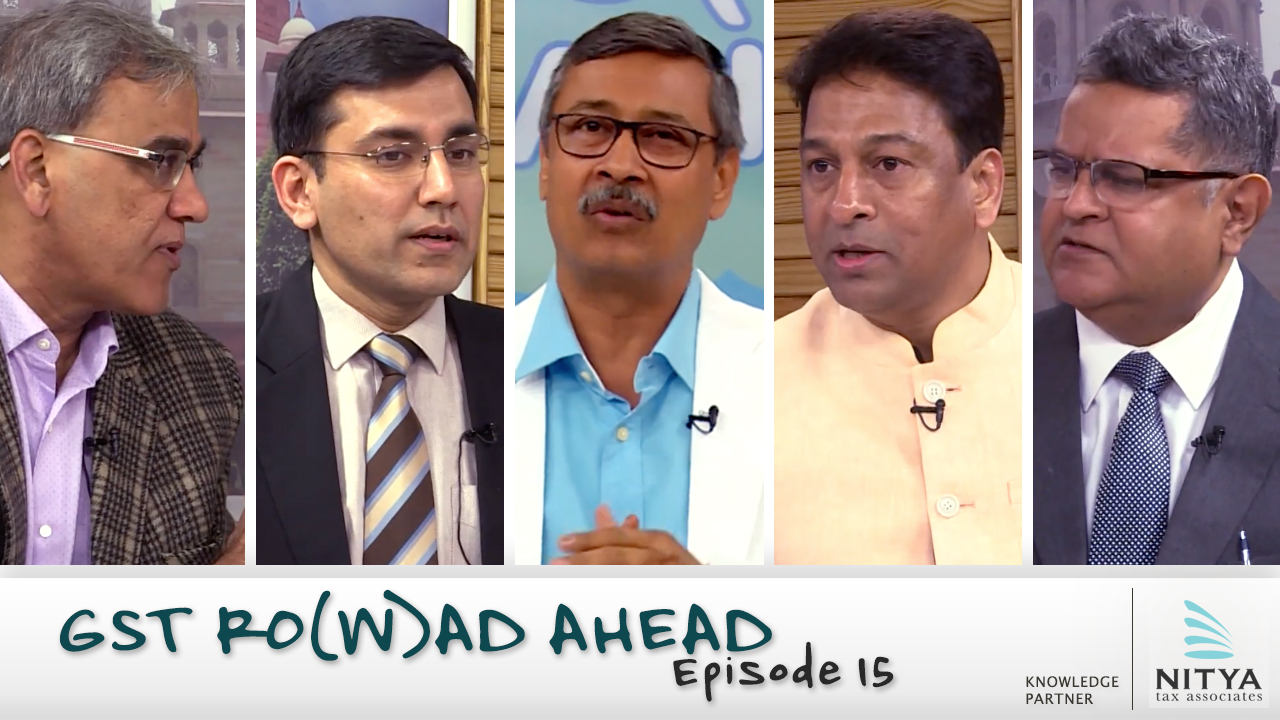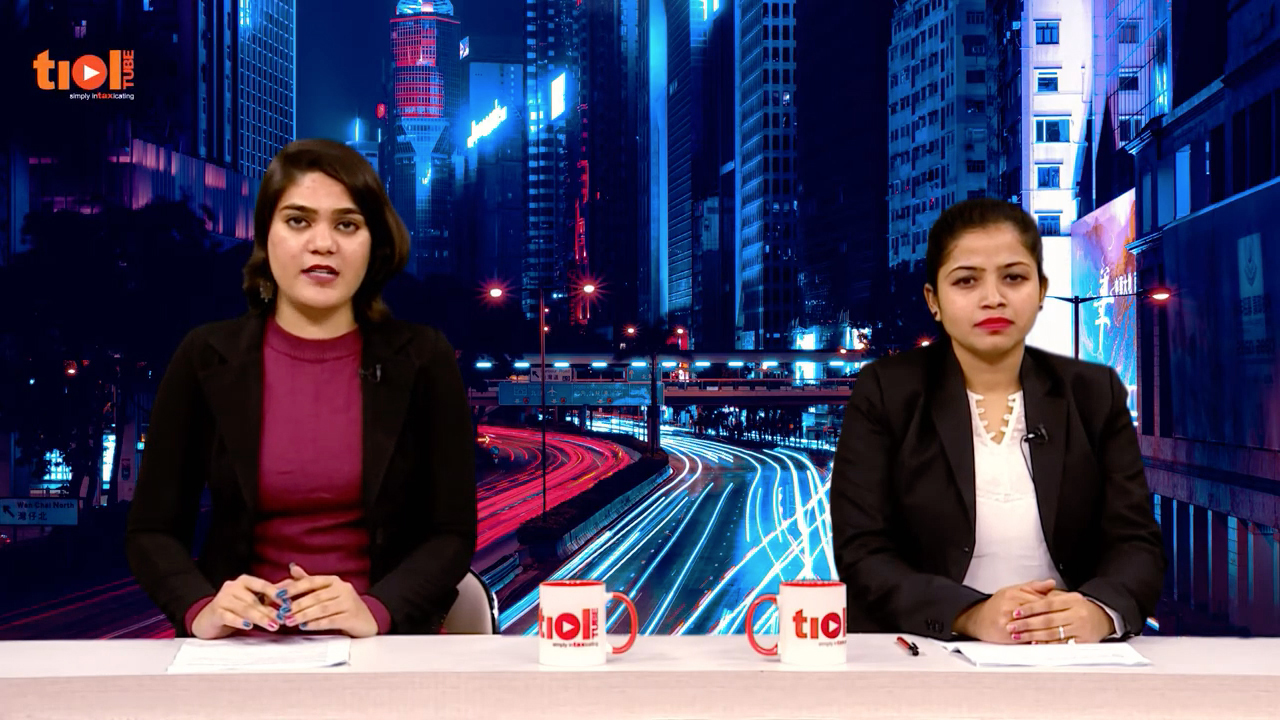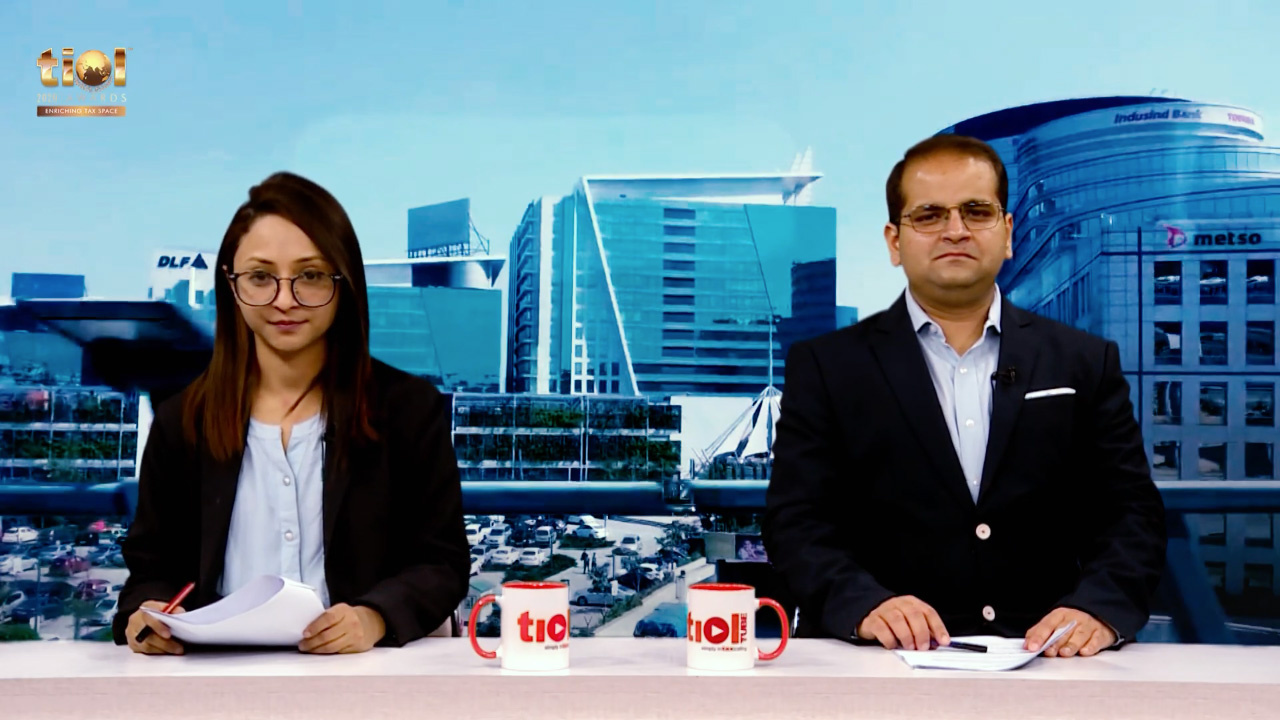|
2020-TIOL-30-AAAR-GST
Nurserymen Cooperative Society Ltd
GST - Applicant is an association of persons and is in the business of maintaining gardens and landscape development for State and Central governments, local bodies and government undertakings - they are also providing pure services to these service recipients and the same is exempted by way of sr. no. 3 of 12/2017-CTR - applicant states that he is sub-contracting this work to the sub-contractors and sought to know from the Authority for Advance Ruling as to whether such sub-contact work is liable to tax under the Act - AAR held that e ven assuming that the activity of the applicant, is either covered in entry no. 3 or 3A of 12/2017-CTR, the activity supplied by the sub-contractor to the applicant would not be exempt as it is not covered either in Entry no. 3 or 3A of 12/2017-CTR since the applicant does not belong to the class of recipients enumerated therein - aggrieved, appellant is before the Appellate authority.
Held: Issue being examined is whether the services supplied by the sub-contractors to the appellant, who is the recipient of the services, is exempted from GST - Entries under Sl. no. 3 and 3A will apply only if the recipient of services is a government (Central/State/UT) or local authority or a Governmental authority or a government entity - in this case, the appellant who is the recipient of the supply from the sub-contractor is a co-operative society and not an entity specified in Sl. no. 3 and 3A - When the criterion of the notification is not satisfied, the sub-contractors as suppliers of service, will not be eligible for the aforementioned exemption - While the Authority agrees that the appellant will not be eligible for the Input Tax credit of the tax paid on the inward supply from the sub-contractors as the output supply made by the appellant to the Government department is exempted, the same cannot be a ground for allowing the sub-contractors to avail the benefit of exemption - It is a well settled law that exemption notifications are to be interpreted strictly as to their eligibility - One cannot be influenced by extraneous factors while determining a person's eligibility to an exemption notification - Therefore, on a strict interpretation of the Entry Sl. no. 3 and 3A, Authority holds that the supply of services by the sub-contractors to the appellant is not eligible for the benefit of exemption under either Sl. no. 3/3A of 12/2017-CTR - Order of Authority for Advance Ruling is upheld and appeal is dismissed: AAAR
- Appeal dismissed: AAAR
2020-TIOL-29-AAAR-GST
Acharya Shree Mahashraman Chaturmas Pravas Vyavastha Samiti Trust
GST - In the matter of an application filed by the Appellant, a Trust, the AAR had held that the applicant is liable to pay tax on renting of temporary residential rooms of all categories to devotees if the declared tariff of a unit of accommodation is Rs.1000 or more per day or equivalent; that they are also liable to pay tax on renting of space for stalls; on supply of food and beverages at subsidised rates to devotees; on providing space for registered person without consideration for supply of food and beverages to devotees only if the applicant and such registered person are 'related persons'; is liable to tax for acting as an intermediary for booking of hotel rooms to the pilgrims from outside if he does not satisfy all the conditions for being considered as a 'pure agent' - Aggrieved by the ruling insofar as the renting of 2BHK and dormitory is concerned since under these two categories the charges are per room for a 2BHK and per bed for the dormitory and in both the cases, the charges are less than Rs.1000 per room/bed per day, the appellant is before the AAAR.
Held: Delay in filing appeal is condoned by the Authority in exercise of the powers vested in terms of the proviso to s.100(2) of the CGST Act - Authority finds that in the context of the appeal filed, the appellant is not renting out 'rooms' but rather is renting out units of accommodation comprising of 2 bedrooms, hall, kitchen, restroom, toilet etc. and the entire unit with facilities like water, electricity, cot, bed, pillow, bedspread and air-conditioner is given out on rent - The devotee is also given cooking facililty in this unit, therefore, the unit of accommodation of this kind which is termed by the appellant as a 2BHK category I type of accommodation cannot be considered as renting of rooms and will not be covered against Sr. no. 13 of 12/2017-CTR - similarly, renting of beds in a dormitory is also not akin to renting of rooms and hence it will not qualify for exemption under Serial 13(b) of 12/2017-CTR - Appellate Authority, therefore, agrees with the Authority for Advance Ruling and holds that the renting of the 2BHK unit and the dormitory will be chargeable to GST as a single unit where the value of supply will be the charges for the full 2BHK unit/dormitory and not the charges for each room/bed and is liable to tax in terms of Entry no. 7 of 11/2017-CTR - order of AAR upheld and appeal dismissed: AAAR
- Appeal dismissed: AAAR
2020-TIOL-28-AAAR-GST
Maarq Spaces Pvt Ltd
GST - Applicant entered into a Joint Development Agreement (JDA) with landowners for development of land into residential layout along with specification and amenities - consideration was agreed on revenue sharing basis in the ratio of 75% for landowner and agreement holder and 25% for applicant - cost of development was to be borne by the applicant - pursuant to JDA, the applicant had entered into an agreement with customers for sale of developed plots for consideration - Applicant sought to know as to whether the activity of development and sale of land attract tax under GST and if the answer is in the affirmative, for the purpose of taxable value, whether the provision of rule 31 of Rules can be made applicable in ascertaining the value of land and supply of service - Authority held that Applicant has no right in the title of the land and, therefore, they cannot be considered as the sellers of the plots; that they are only service providers in the whole process, be it development of the raw land into residential plots or their sale after the development, therefore, entire amount received by them is liable to be taxed under GST; that Rule 31 of the Rules applies in the instant case and the value of the supply is equal to the total amount received by the applicant, which is equal to 25% of the open market value of each plot - Appeal to the Appellate authority.
Held: In real estate transactions involving plotted development, one party owns the land and another party has the expertise to develop the land - The two parties come together with the common intention of developing the land and sharing the revenue accruing for the sale of the developed plots in the land - however, the landowners give the rights of using the land to the developer in exchange for which, the developer gives the service of developing the land of the owners - while the joint development agreement is entered into for the two parties to jointly reap the benefits of the sale of the land to customers, there is a clear rendering of a service by the developer to the landowner in developing the land which belongs to the landowner - therefore, the activity of developing the land is a supply of service by the appellant - A combination of two activities, one of which is not a supply under GST cannot be said to be a composite supply - Findings of the lower Authority upheld and appeal dismissed: AAAR
- Appeal dismissed: AAAR
2020-TIOL-27-AAAR-GST
Tata Coffee Ltd
GST - AAR had held that the t ransaction of depositing timber with the Government Timber depot (auctioneer) for disposal as per s.104 of the Karnataka Forest Act amounts to "supply" and GST is chargeable - value would be the open market value or the value as determined u/r 30 or 31 of the Rules; that t here is no provision in the GST Act for shifting the tax liability and considering that as a deemed discharge of liability; that there are two supplies involved in the chain of transactions, one when the timber is handed over to depot by applicant and the other when the said timber is sold by depot; that both are independent supplies and tax needs to be discharged at both stages, time of supply being the time of removal; that activity of providing supervision services is not covered in exceptions in Entry 5 of 13/2017-CTR and is liable to tax under reverse charge; that in case the timber depots are not government departments, then the depot shall collect GST and issue invoice to applicant - Appeal to AAAR.
Held: In the instant case, there is a transaction in goods inasmuch as timber is being deposited by the appellant with the Government Timber Depot (GTD) - This transaction is mandated by a statute i.e. the Karnataka Forest Act, 1963 - further, the activity of felling the timber trees is part of the shade management policy of the appellant in the course of their business of coffee/tea/pepper plantations, however, the activity of depositing the timber into the GTD does not result in realisation of consideration immediately - where the consideration is not extant in a transaction, such a transaction does not fall within the ambit of supply but in certain scenarios as elucidated in Schedule I of the CGST Act, 2017, the key element of consideration is not required to be present for treating the activity as supply - notwithstanding the fact that the depot is set up under the aegis of a statute, it functions in the capacity of an agent - in the instant case, once the lot of timber is sold to a successful bidder, the purchaser is required to pay 1/4th value of the timber purchased along with applicable taxes and later the balance dues - therefore, it is observed that the sale of timber happens through the GTD and not to the GTD as claimed by the appellant - the proceeds of the timber sold through the auction process by GTD is given to appellant on completion of the auction process, hence GTD acts in the capacity of an agent of the appellant and this transaction amounts to a supply in terms of clause 3 of Schedule I of the Act - time of supply will be the date of issue of invoice which will be at the time of removal of the timber by the appellant to the depot - appellant has not disputed the ruling with regard to taxability of supervision charges - accordingly, the ruling given by the lower authority is upheld: AAAR
- Appeal dismissed: AAAR
2020-TIOL-26-AAAR-GST
Wework India Management Pvt Ltd
GST - Appellant is in the business of supplying shared workspace/office space to the freelancers, startups, small businesses and large enterprises - to this end, the applicant procures goods and services from various contractors for fitting-out of the workspace and provides the said workspace on rent to various companies and individuals as sharing work-spaces - applicant had sought to know from the AAR whether they are eligible to avail ITC on the detachable 14mm Engineered wood with Oak Top wooden flooring which is movable in nature and capitalised as 'furniture and fixture' and is not capitalised as 'immovable property' - they also sought to know as to whether they are entitled to avail ITC on detachable sliding and stacking glass partition which is movable in nature and capitalised as ‘furniture and fixture' and is not capitalised as 'immovable property' - AAR had observed that Detachable wooden flooring and sliding and stacking of glass partitions are fixed to the buildings to create the office spaces and hence is a sine qua non for letting out of the office spaces; that there cannot be office space unless these are fixed and hence it can be said to be permanently fastened to the building; that since this activity amounts to addition or alteration to an immovable property, ITC is not available - Insofar as fixing of 14mm Engineering wood with Oak top wooden flooring is concerned, the same can be easily detached and reused as it only adds to the value to the building and is not sine qua non for the office space unlike the partitions and it is not covered under ‘construction of immovable property' and, therefore, ITC of GST is not available on the detachable sliding and stacking glass partition but ITC is available on the detachable 14mm Engineered Wood with Oak top wooden flooring - Appeal filed before the AAAR against the portion of the order that denies the ITC on detachable sliding and stacking glass partitions.
Held: Glass partitions are not permanent and are not embedded to the earth - They can be dismantled and moved according to the requirements of the clients of the appellant - although they are fixed to the earth with nuts and bolts, they can be dismantled without demolishing the civil structure, therefore, the detachable sliding and stackable glass partitions do not qualify as 'immovable property' - further, the detachable sliding and stackable glass partitions are accounted in the books of account as ‘fixed assets' under the head 'furniture and fixtures' - They are not capitalised as immovable property but rather as movable assets - intention of fixing the glass partitions is only to provide clients with a certain sense of privacy and for the purpose of demarcation of work space area; there is no permanency in affixing such partitions as the same can be dismantled and re-fixed to signify a change in the dimensions of the work space - fixing of partitions to the ground using nuts and bolts only serves to give a false sense of permanency while in reality it is not so - therefore, procurement of detachable sliding and stackable glass partitions will be eligible for ITC and will not be hit by the provisions of s.17(5)(d) of the CGST Act, 2017 - this portion of the order of AAR is set aside and appeal is allowed: AAAR
- Appeal allowed: AAAR
2020-TIOL-25-NAA-GST
Director General Of Anti-Profiteering Vs JK Helene Curties Ltd
GST - Anti-Profiteering - s.171 of the CGST Act, 2017 - DGAP was requested to conduct a detailed investigation as per rule 129(1) of the CGST Rules, 2017 in the matter of the allegation that M/s Raymond Ltd. had not passed on the benefit of tax reduction from 28% to 18% w.e.f 15.11.2017 on 'After-Shave lotion Park Avenue Good Morning 50 ml' which was supplied to M/s Big Bazar, Inderlok run by M/s Future Retail Ltd. on 08.11.2017 under Purchase Order with MRP of Rs.115/- per unit, on 19.12.2017 under PO with the same MRP of Rs.115/- per unit and on 12.06.2018 vide PO again with the same MRP of Rs.115/- per unit - report submitted by DGAP and respondents have also filed replies to the same and were heard by the Authority.
Held: There was no reason for the respondents to increase their base prices exactly equal to the rate of tax reduction w.e.f 15.11.2017 - Such a coincidence is incomprehensible, strange and unheard of which shows that the respondents have deliberately tried to pocket the benefit of tax reduction to enrich themselves at the expense of the vulnerable customers - accordingly, on the basis of the pre and post reduction GST rates and the details of the outward taxable supplies of the impacted products made during the period 15.11.2017 to 31.03.2019 the profiteered amount in respect of respondent no. 1 has been rightly computed at Rs.18,48,43,084/- channel/customer wise including the GST, details of which have been mentioned in the report dated 24.09.2019 of DGAP; this amount includes an amount of Rs.8,97,253/- including GST which the respondent no. 1 has profiteered from respondent no. 2 - state wise profiteered amount has been calculated as Rs.38,64,891/- including GST in respect of respondent no. 2 - DGAP is bound to investigate all such cases in respect of which the above benefits are required to be passed on and furnish report accordingly to the Authority once the violation of the provisions of s.171 come to his notice during the course of investigation - DGAP is legally required to investigate and bring before the Authority all those registered persons who have failed to pass on both the above benefits not withstanding whether any allegation has been received against them or not once he has become aware of such violation - during the course of investigation, the DGAP had further found that the respondents had not passed on the benefit of tax reduction in respect of other products also which were being supplied by them inspite of tax reduction and, therefore, he was legally bound to investigate and bring this infringement of s.171 to the notice of the Authority - respondents cannot be allowed to deny the benefit of tax reduction to their customers on the ground of jurisdiction and misappropriate the amount of benefit of tax reduction which they were not required to pay from their own pockets - respondent has not kept the pre and post rate reduction base prices the same and has thus profiteered to the extent of Rs.6.49 per unit of the impugned product and has denied the benefit of tax reduction - claim of respondent that wherever it was feasible to increase the grammage instead of reducing the MRPs he had increased the same from January 2018 is without any evidence and cannot be relied upon - plea of the respondent that post 15.11.2017 he had reduced the rate of GST from 28% to 18% in the invoices issued by them to their customers and hence they had passed on the benefit of tax reduction to the customers is wrong and misleading as mere charging of GST @18% after the tax reduction does not amount to passing on the benefit of tax reduction in view of the fact that the respondent had increased the base prices of his products w.e.f 15.11.2017 and then charged GST @18% on them whereas he was legally bound not to increase the base price - respondent had continued to charge the same cum-tax prices which he was charging before the tax reduction and hence, he has not passed on the benefit of tax reduction - such hollow plea of respondent cannot be accepted - respondent was required to stamp or re-sticker or re-print the MRPs on all the impacted SKUs as per the letter issued by the Ministry of Consumer Affairs, Food and Public Distribution, GOI dated 16.11.2017, however, respondent had not complied with the above direction and has continued to sell his impacted SKUs at the pre-reduction MRPs - respondent had simply transferred his legal obligation to his distributors who had no power to re-fix the MRPs and stamp/re-sticker/print them on the impacted SKUs - since the MRPs were not reduced and affixed on the above SKUs by the respondent there is no likelihood of their being sold to the consumers at the commensurate reduced MRPs keeping in view the above rate reduction - respondent has, therefore, acted in contravention of s.171(1) of the Act - absence of Judicial Member does not cause any prejudice to the respondent, hence their contention that the constitution of the Authority is illegal is untenable - It is accordingly held that the amount of profiteering in the case of respondent no. 1 is Rs.18,48,34,084/- and in respect of respondent no. 2 is Rs.38,64,891/- - since the recipients in this case are not identifiable, these amounts are required to be deposited in the Consumer Welfare Funds of the Central and State governments concerned as per the provisions of rule 133(3)(c) of the Rules, 2017 in the ratio of 50:50 along with interest @18% - for the aforementioned contraventions, penalty is imposable u/s 171(3A) of the Act, 2017 - amount to be deposited within a period of three months and a report is required to be submitted by the Commissioners concerned within four months - due to COVID-19 pandemic the order could not be passed on or before 24.03.2020 as mandated by rule 133(1) of the Rules, 2017 but is being passed on 11.05.2020 in view of notification 35/2020-CT dated 03.04.2020: NAA
Applications disposed of: NAA | |









